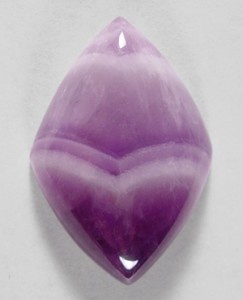The February birthstone is Amethyst known earlier as Jasper.Amethyst, the Gemstone of Sobriety, has long been the favorite of spiritualists the world over, from the Buddha and Tibetan Llamas to Catholic Bishops. This Purple colored crystal is from the quartz family and is considered to be an antidote for intoxication. Anyone listening from the Alcoholics Anonymous?
The Meaning, Significance and Symbolism Of The Amethyst, February Birthstone
Those born in the month of February are blessed with Amethyst as their birth gemstone. This stone was believed to ward off the intoxicating and alluring powers of Bacchus by the ancient Greeks and Romans, as well as keep the wearer calm, sharp and quick-witted. The Amethyst is a lovely deep purple, and is among the popular gemstones around the world for its striking beauty, deep color and minimum inclusion. During the Middle Ages, the stone was believed to have symbolized royalty. Today, the Amethyst is prized for the associated qualities of peace, courage, stability, sincerity and strength it is supposed to bestow on the wearer.
Aquarius Birthstone
 Persons born under this sign match are seen as trendsetters for the future. There is a high responsibility bestowed upon them and pressure for personal change. They are mind-oriented individuals whose thoughts never stop tick-tucking over. Most Aquarians are extreme humanitarians and are involved in social programs that assist others. They are objective in judgments, outgoing and amicable.
Persons born under this sign match are seen as trendsetters for the future. There is a high responsibility bestowed upon them and pressure for personal change. They are mind-oriented individuals whose thoughts never stop tick-tucking over. Most Aquarians are extreme humanitarians and are involved in social programs that assist others. They are objective in judgments, outgoing and amicable.
Amethysts help keep Aquarius level-headed when you wear them. The stone’s name literally means, “avoiding drunkenness.”
Interesting Facts About The February Birthstone
In Greek mythology, a beautiful maiden called Amethystos was known to have rebuffed Dionysus, the god of wine. The legend says that the maiden prayed to the Gods to keep her chaste, resulting in her transformation to a white stone from a maiden. Dionysus, driven by grief, is said to have poured wine on the stone, turning it purple. As a result, the Amethyst is often associated with romance, lust and love.
Etymology Of The February Birthstone
The Amethyst gets its name from Ancient Greek, derived from ‘methustos’ or intoxicated. The stone is believed to protect its wearer from intoxication. The Greeks and Romans wore amethyst on their person and created drinking vessels from the stone to prevent inebriation and intoxication. How Light Will Affect Your February Birthstone
Scientific Make up – Composition of The Amethyst

Amethysts are composed of Quartz, the second most abundant material found in the Earth’s crust. Quartz is frequently found lining the insides of geodes, as is the February birthstone, the Amethyst. The amethyst is a transparent variant of silicon dioxide (SiO2), with colors ranging from light mauve to a rich, beautiful purple.
Most scientists believe that the color of the Amethyst is due to its iron oxide content. Others argue that Manganese or Hydrocarbons color the stone deep purple. Amethysts are sensitive to heat. When the stone is heated to 400 or 500 degrees Celsius, it changes color to red or brownish-yellow. Under certain controlled conditions, the stones turn a deep, rich green. Heat treatment can also result in the Amethyst transforming into a naturally occurring yet rare mineral called the Citrine.
Characteristics Of The February Birthstone
Color
The Amethyst possesses a distinct violet color. Most stones range from light pink to dark purple. The most popular tone is a vivid purple flecked with a pink rose hue. Very few stones are homogeneous in their coloring owing to a unique, layered crystal structure. A few stones also exhibit red and blue color tones. The variety of color exhibited by the February birthstone has lead to its global popularity.
Origin
The best varieties of the Amethyst gemstone are found in Siberia, Brazil, Sri Lanka, The United States and the Far East. Until the early eighteenth century, the amethyst was accorded a regal status. The amethyst was believed to be a part of the cardinal gemstones, in the same league as the Diamond, Ruby, Emerald and Sapphire. Due to the discovery of extensive deposits of amethyst in Brazil, the stone is no longer considered as precious.
Healing Power Of The February Birthstone
Besides its aesthetic value, the stone is believed to be effective in curing a range of health problems including headaches, arthritis, insomnia, withdrawal symptoms and poor blood circulation. The Amethyst, owing to popular legend is also believed to prevent the wearer from becoming intoxicated. There is a widespread belief that the Amethyst aids in dream recollection after waking. Famous Gems In Shades Of Purple.
Historical Importance Of The February Birthstone
According to legend, the signet ring worn by Cleopatra was an Amethyst. The ring was engraved with the figure of Mithras, the Persian deity symbolizing the divine Idea- The Source of Light and Life.
In the fifteenth century, Leonardo Da Vinci extolled the virtues of the Amethyst, particularly its ability to keep one’s thoughts sharp and clear, enabling sound business decisions.
Value Of The Amethyst
Amethyst works as a natural tranquillizer which relieves stress and strain. This February birthstone is known to soothe irritability and balance mood swings and rage. The stone alleviates sadness and grief, activates spiritual awareness and works to purify spaces of negative vibrations. Its rich purple color pairs well with any outfit, traditional or western, and well-cut stones form pendants of expensive necklaces and rings. Amethyst looks good when paired with gold and silver, making this stone a popular choice in pendants and other jewelry.
Those born in February are blessed with a beautiful, rich, vivid violet gemstone that works not only to adorn one’s outfit but has an array of healing abilities for a person’s physical and mental well being. This stone has been revered through the ages and continues to be in demand for its well-cut faces, vibrant color and health benefits.
| Crystal Structure: hexagonal Chemical Composition: Transparent Quartz – Silicon Dioxide, SiO2 Hardness: 7 MOHS |
Refractive Index: 1.5 Colors: deep violet to pale purple |
